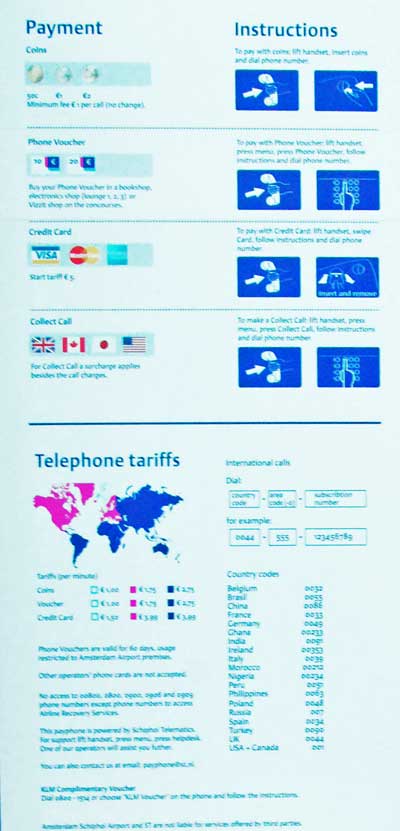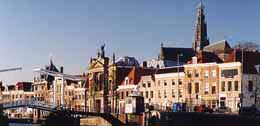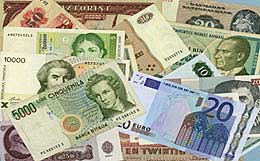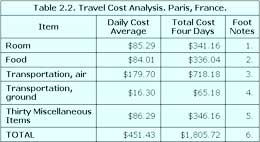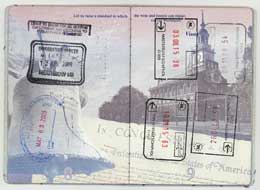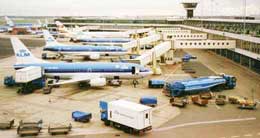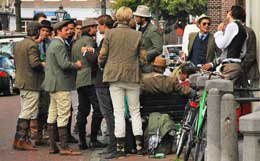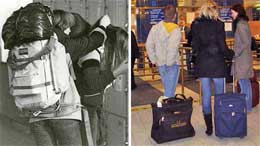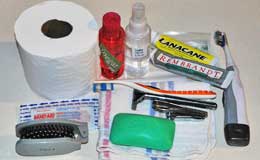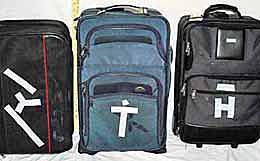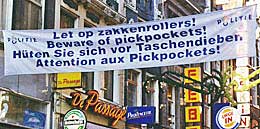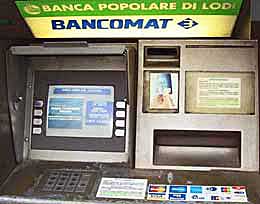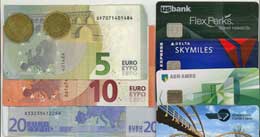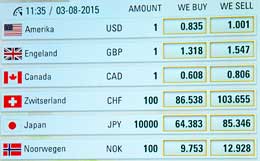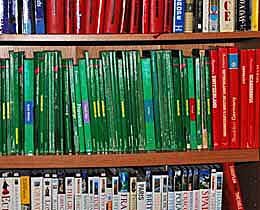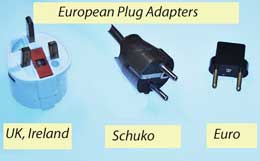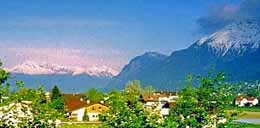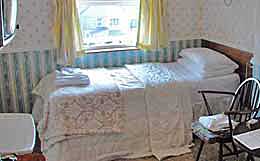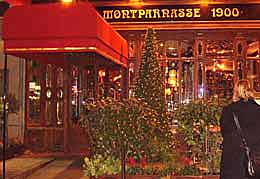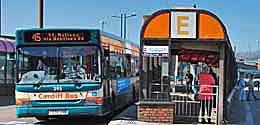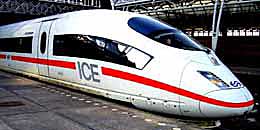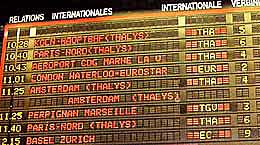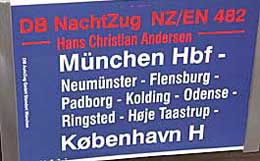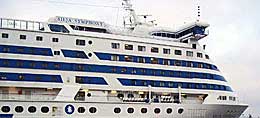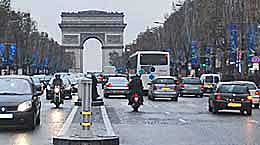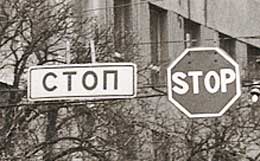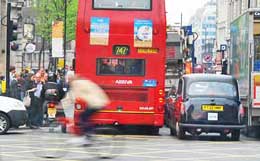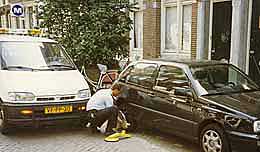Telephoning to, from, and within Europe
City codes, 10-10, telephone cards, cell phones, PTT
Country codes, city codes, costs, discounts, telephone cards, mobile cell phones.
You'll find stores in every international airport offering various cell phones and billing plans. This company has its business located a few meters/yards from the hotel booking office in Amsterdam's Schiphol Airport.
The technology of mobile phones changes so fast that it is impossible to keep up. There has never been anything in history like this blizzard of thingies. Some of the recent offerings available from Amazon include:
- LG Nexus 5X Unlocked Smartphone,
- BLU VIVO 5 Smartphone 4G LTE GSM Unlocked,
- Apple iPhone SE Unlocked,
- Sony Xperia Z5 Unlocked Phone, and
- Microsoft Lumia 735.
Carpe diem. Vivere bene! Gratia Deo.
HOW TO EUROPE: The Complete Travelers Handbook - - Chapter 19.1: Telephones - -
This entire book is placed on-line gratis by the author, photographer, and webmaster. That's me, John Bermont. My DIY project comes with help from my daughter Stephanie. I welcome questions, comments, and complaints.
Last update . For contact information please see Your Blow Back at the foot of this page.
Pick up the phone. Go ahead, pick it up.
This Internet edition of chapter 19 is divided into four parts because it is so big. The four parts are:
- Telephone Europe: Codes, 10-10, cards, cells, PTT. ⇐ You are here.
- Mail: Air Mail, Priority Mail, PTT, Poste Restante.
- Internet and Email: Europe's Cyber Cafes and WiFi.
- Telegrams: Wiring Cash and Keeping in Touch.
What had been an expensive poor quality telephone system in Europe 30 years ago is now simply amazing. You can pick up your phone and cheaply call billions of people around the planet with clear connections.
CALLING EUROPE FROM THE USA
Traditional international telephone services from the United States are handled by every phone company. These companies are in fierce advertising wars claiming better quality and lower costs and I couldn't begin to figure it out. I don't understand my phone bill.
The Standard System
All American telephone numbers have 10 digits, three for the area code and seven for the local number. Over there it is a different story. European numbers can have any assortment of digits and arrangements.
Country Code
Every country in the world has a country code. For North America, including Canada, the USA, Mexico, and The Caribbean, the country code is 1. The UK code is 44. Holland is 31. You'll usually see the country code written with a plus sign in front of it, for example +353 for Ireland.
City Code
Instead of area codes, all European countries use city codes. Each city code begins with zero. For example, 023 is the city code of Haarlem, The Netherlands. Within Holland you would dial 023 plus the local number. But from outside Holland you only dial 23. However, Italy has changed their system and now requires you to dial the zero on incoming international calls also. City codes can vary from two as in Brussels, 02, to five as in Salzburg, 06222.
Local Numbers
Local numbers in Europe can vary in length from four up to nine numbers. In a small village they don't need many numbers, but in Berlin you've got a couple of million phones.
Rates to Europe for calls from the United States mainland do not vary from state to state. A call from San Francisco to Paris costs the same as a call from New York to Paris. The rate period is determined by the time at the telephone where the charge will be paid.
10-10 Services
The "10-10" services are still a pretty good deal, even with price increases in the past few years. Tariffs vary between different services. You might get a lower connection fee in exchange for a higher per minute fee, something you would want if you make short calls. Shop around. Some plans have varying rates during the day for domestic calls. International rates for different countries can be significantly different.
The low cost 10-10 services have made life so much easier. You can call Europe for less than the cost of a call to someone only 30 miles away in the USA. I have used several of the 10-10 services and change whenever I find a better deal. It is very convenient. You do not need to subscribe and can stop using one and start using another whenever you wish. The bill is included on your regular phone bill.
Not all 10-10 numbers are available in all parts of the USA. Some are restricted to a few states. It depends on your local phone company. My costs are included on my regular phone bill.
VoIP
Voice over Internet Protocol, better known by it's initials VOiP, is probably cheaper than any of the 10-10 services. You must have a computer and be on the Internet to use the sevice.
Skype
Skype is another Internet based communications tool. The best feature of Skype is that it is free when you talk with another Skype subscriber. Not only that, you can see the other person live if they have a web cam, a more or less standard appliance on most lap top computers these days. To use Skype you download the free software and select a user name. Then get the user names of the people you want to Skype with and add them to to your directory. Then click and talk and watch. The other person must have their computer turned on and have Skype running.
I have used Skype to stay in touch with Stephanie when she was in Paris for a month, and I use it often to talk with my friend Paula in Holland. It works anywhere in the world. Free international calling with video — you can't beat that!
When you are traveling you must have access to an Internet LAN or WiFi connection of course. Sometimes these are free, but not in very many places. To save money you can subscribe to a WiFi service like Boingo for about $10 a month. Another service named Gogo provides internet service on selected airlines while you are in the air, either on a per flight basis or a monthly subscription basis. This is quite a bit more expensive and would only be practical for frequent business flyers. Delta Airlines gave me a free trial on a recent flight. If you are sitting in a major airport waiting hours for your connecting flight you might be able to connect on the free WiFi of one of the airline lounges from outside the door. Membership in these lounge programs costs a few hundred dollars a year but you can sometimes catch a stray WiFi signal for free.
HOW TO PLACE A CALL TO EUROPE
From Areas Equipped With International Dialing
- Dial the USA international access code: 011
- Then, dial the country code.
- Then, the city code, without the zero in front (do dial the zero for Italy).
- Then, the local number.
As an example, to call the Munich Tourist Office in Germany:
- dial the international access code, 011,
- then the country code for Germany, 49,
- then the city code for Munich, 89,
- then the local number, 233-96-555.
Dialed calls from the USA are charged for an initial one minute, not three minutes as with operator assisted calls. You might want to confirm this with your long distance carrier since they are changing things all the time.
To make a person-to-person, collect, calling card, third number billing, or any international call requiring the assistance of an operator, call your long distance phone company.
From Areas Without International Dialing
If your area does not have international dialing, call your operator to place all international calls. Tell the operator you wish to make an overseas call and give her the country code, city code, and local number. If your call does not require special operator assistance (collect, charge card, person, etc.), the lower dial rate should apply but I don't guarantee it.
10-10 Number International Dialing
You probably have an instruction sheet describing the procedure for making international calls with your 10-10 number. I dial:
- 10-10-987, my 10-10 number
- the USA international access code: 011
- the country code.
- the city code, without the zero in front (do dial the zero for Italy).
- the local number.
The beauty of this is that your area does not need to have international dialing enabled. But you do need to find a 10-10 number for your area.
How To Profit From This Telephone Intelligence
How do you apply this information to your advantage? Well, after your travel agent tells you that the lowest cost room in Paris is $200 per day, go home and open your Michelin Red Guide - France and find a three star hotel for $100 in the arrondissement (section of the city) you want to stay in. Wake up early the next morning and call the hotel to make your reservation. The Michelin Red Guides show city codes. It's the number next to the symbol that looks like a telephone dial, or a daisy if you will. This appears on the first or second line for each city heading. If there is no city code listed here, then the phone number listed for each hotel includes the city code. Hotels in all price categories are listed.
Many hotels are on the internet and many of them have on line booking, either directly with the hotel or through an agency. I am skeptical of using these web sites so I might send an email or get the phone number and call them up. In my experience hotels are slow to respond to emails. Making the call gives you instant results.
Don't be bashful about calling. You will get a connection within a minute at most times. It is best to call during the week, but not during their lunch time, noon to 13:00 or noon to 16:00 depending on the country. Speak up, right away, slowly and clearly. Here is your script:
"Hello! Mr./Mrs./Miss — your last name —
calling from the United States of America.
Do you speak English please?"
Odds are excellent that an English speaking person will be available within a minute or so. If not try another hotel. For about a dollar worth of telephoning, you should be able to make a reservation and find out what amount of advance deposit is required. If they do not accept credit cards you can propose sending a check which they can hold until you get there. It will be too expensive for them to cash it.
If you have a friend who speaks the language of the country you are calling, you might ask them to make the call for you. This could be especially helpful if you are looking for a room in a small town where there might be only one or two hotels, and where desk clerks are less likely to be fluent in English.
Why can't your travel agent make the phone call and reservation for you, you ask? Because the $200 hotel pays the agent a 12% commission and probably has a toll free (800) telephone number. The $100 hotel pays no commission and it will cost to make the telephone call. I'm not throwing disparagement on travel agents. They provide a valuable service for many people. But you can't expect travel agents to be altruists. They are trying to make a living like everybody else and their business is not a piece of cognac-filled chocolate. You have to make the call yourself if you want to be frugal and stay in a European tourist class hotel. See chapter 14, Hotels, Hostels, B&Bs, Private Homes: Sleep Options for Travel in Europe , for a description of what to expect in a tourist class hotel.
TELEPHONE COUNTRY CODES
Here are listed the telephone codes for the countries of Europe, and the city codes for a metropolis or two in each country. If you need more, consult your long distance telephone provider.
Codes for dialing TO:
Albania 335. Tirana 4
Andorra 376. All points 628
Austria 43. Graz 316; Innsbruck 5122; Salzburg 662; Vienna 1
Belarus 375. Minsk 17
Belgium 32. Antwerp 3; Brussels 2; Ghent 9; Liege 4
Bosnia & Herzegovina 387.
Bulgaria 359. Sofia 2
Croatia 385. Zagreb 1
Cyprus 357. Nicosia 2
Czech Republic 420. Prague 2
Denmark 45.
Estonia 372.
Finland 358. Helsinki 9; Tampere 3; Turku 2
France 33. Bordeaux 56; Marseille 91; Nice 93; Paris 1
Germany 49. Berlin 30; Frankfurt 69; Leipzig 341; Munich 89
Greece 30. Athens 01; Patras 061; Thessaloniki 031
Hungary 36. Budapest 1; Gyor 96
Iceland 354.
Ireland 353. Cork 21; Dublin 1; Limerick 61
Italy 39. Genoa 010; Florence 055; Milan 02; Rome 06; Venice 041
Latvia 371.
Liechtenstein 423.
Lithuania 370. Vilnius 2
Luxembourg 352
Macedonia 389. Skopje 31
Malta 356.
Moldova 373.
Monaco 33. All points 93
The Netherlands 31. Amsterdam 20; Haarlem 23; The Hague 70
Norway 47.
Poland 48. Gdansk 58; Warsaw 22.
Portugal 351. Lisbon 1; Porto 2
Romania 40. Bucharest 1
Russia 7. Moscow 95; St. Petersburg 812
San Marino 378
Serbia and Montenegro 381. Belgrade 11
Slovakia 421. Bratislava 7
Slovenia 386. Ljubljana 61
Spain 34. Barcelona 93; Madrid 91; Seville 95; Valencia 96
Sweden 46. Göteborg 31; Malmö 40; Stockholm 8
Switzerland 41. Basel 61; Bern 31; Geneva 22; Zurich 1
Turkey 90. Ankara 312; Istanbul 212
Ukraine 380. Kyiv 44
The United Kingdom 44. Birmingham 121; Glasgow 141; London 20
Vatican City 39; all points 06
The country code for the USA, Canada, and the Caribbean is 1.
LOCAL TELEPHONE SERVICE IN EUROPE
Telephone service in Europe is generally excellent, with possible exceptions in some of the eastern countries. In all countries telephone service has improved dramatically in the past 20 years. Some of their systems are better than American systems, though they are all more expensive than ours.
Dial slowly, especially where the system is pulse rather than tone. Speak slowly and clearly in all countries.
On the Meter
In America we are used to having a local toll free calling area. Within a 10 to 15 mile radius around our home we can talk all day and not be charged a penny above our basic service cost, for most telephone companies. In Europe, it is completely different. Every call, no matter where, is charged by the minute. This is the way AT+T charges for its Uverse service in the USA now, unless you subscribe to unlimited voice.
Telephone Booths
Telephone booths are not very plentiful. They never were in Europe and with everyone using a "mobile" they sure won't be installing more of them.
Calls within a country can be made from any phone booth, when you find one. Just insert some coins, dial the city code and then the local number. When dialing a city code from within that country, you must dial a zero first. In Finland dial a 9 first. For example, to place a call to the Munich Tourist Office from any city in Germany, dial the city code, 089, and then the local number, 233-96-555. They usually speak English at the tourist office.
Unfortunately many phones in train stations have been sabotaged with slugs or have had the handset cut off. What can you do with one of those? If you see someone having trouble with a phone, wait in line at a booth where the person seems to be enjoying a conversation. That way you'll make sure that you get one that operates.
Instructions are usually given in three or more languages or in easily understood diagrams, known as pictograms. The method of operation varies from country to country. Normally, you lift the receiver, insert some coins, get a dial tone, and then dial. The sound of the dial tone varies from country to country. Sometimes it even sounds like the American busy signal. Sometimes the sound of the other phone ringing sounds like the American busy signal. The busy signal in Europe is usually a very short repeating buzt buzt buzt.
Coins and Slugs
In France, the mode d`emploi (operating procedure) of the older phones makes it easy to lose connections and money. Some require French coins, but there are some in cafes and other places that require a jeton (slug). Buy the slug from the barkeeper. Do not put any money in the French phone until you get an answer. Have the coin or slug ready and drop it in immediately when the person answers. The other party can be heard over a loud static, but they can't hear you until the coins fall in the box. Then the static will stop and you can begin the conversation, si vous parlez la française (if you speak French).
Some phones in Italy require a slug also. It's called a gettone over there. Pronto?
European Telephone Cards
A new system was started by the French in the mid-1980s and has taken hold in most of the countries of Europe. The French name is Telecarte, and goes by local names in other countries, e.g. Carta Telefonica in Italy, Telefonkarte in Germany, Telefonnich Jednotek in Czechia, Telefonkártya in Hungary, etc. These plastic cards are the size of credit cards and contain an electronic chip or magnetic strip which indicate the amount of credit you have.
Cards are available for about $5 and $20. You buy the card at any telephone office or post office. They might also be available at tourist offices, news stands, tobacco shops, money exchange offices, and some other stores. Some cards carry advertising.
To use the card, find one of the telephones which use them. Nowadays that is most phones. It's hard to find a coin phone anymore. Put your card in the slot. A display shows your available credit as you talk. You can use these phones to dial around the world. A big advantage of using telephone cards is that these phones are generally in excellent working order and are usually available while the coin/slug phones are tied up by a local teenager or are busted.
American Telephone Cards
You can also use some American telephone cards in Europe. AT+T and others offer international service in Europe. You usually must dial a local toll free number to use these cards. Each country has a unique toll free system. You won't find 1-800 very often.
Credit Cards
You can use your Visa, MasterCard, or American Express card to place a call from some public phones. A one minute call to the USA from Italy on your credit card will probably cost you about $50. That's not a misprint — fifty bucks! This is a scam, of course, from a crooked telephone service provider and your credit card company will not help you. This situation may be forced on you if the telephone you are using will not accept the regular Italian phone card. Find another phone. In Britain many phones have large advertisements for credit card calls. These cost about $5.00 per minute!
Discount Telephone Cards
There is an alternative to paying the regular national phone companies for international talk. Use a discount service, either with a card or by subscription.
In Switzerland, instead of buying the Swiss Telecom calling card I bought a "Phone Pass" at a newsstand. From any phone I could call the USA and saved up to 75% over the cost of using the official Swiss telephone system.
In talking with a fellow in Amsterdam, he claimed that he could call a friend in another part of Holland cheaper if he dialed it through a discount phone company via the USA. Back and forth across the Atlantic for less than a call within the Netherlands? I can believe it.
When I lived in the Netherlands I subscribed to a service which called itself "One Tel." Rates to the United States averaged about 5.5 cents per minute compared to 6.6 cents per minute for the official Dutch phone company KPN. These rates are only about twice as much as what it costs to phone your next door neighbor in Holland. Go figure. Phone rates make about as much sense as airline fares.
Cellular Phones
Maybe you call them mobile phones or cell phones or annoying devices. Nevertheless you see people with one of these to their ear everywhere you go. In and out of stores and offices, on buses and trains, riding their bicycle or on roller skates, the yumpies of Europe are speaking immediately important stuff, no doubt. It is a distraction when they ring in public, but I am getting used to it. Cell phone prohibitions are posted at the entrance to many buildings, so I guess that some people are not getting used to it.
As much as I scoff at these little things, I used one in Europe and it saved a big problem with meeting someone at a train station. I had made a last minute boarding of an InterCityExpress in Düsseldorf bound for Frankfurt and didn't have time to phone my friend in Frankfurt before getting on the train. As I sat down I noticed that the fellow sitting opposite me was chatting on his mobil, as they are referred to over there. When he was done with his call I asked if I could use it. He obliged and I was able to make my call and let Connie know when and where I would arrive.
American cell phones may or may not work in Europe. I don't need or want one but I have read of some of the issues. As I understand it the main issue is one of frequency. You'll need a "quad" phone to be able to use it in the USA and in Europe. Each phone company has its own service conditions. Before you sign up for cell phone service make sure it will work in Europe, if you plan to bring it over there. While you're on the phone with them ask what the cost is for making and for receiving calls while you are in Europe.
If you need a cell phone in Europe, your best bet might be to rent one after you get there. Tele-communications shops, springing up all over, lease cell phones. Alternatively you can buy a phone with a prepaid chip in many countries.
If you are outside the country of registration and you want to call another country, you pay for two international calls. E.g., say you have a Swiss cellular phone and are in France making a call to Belgium, your call is routed via Switzerland and your bill is a barrel of wampum.
KPN is the name of the former Koninklijke (Royal) PTT Nederland which was the successor of the government owned PTT Nederland. The government is now out of the telephone business. This private company offers telephone, internet, and cable TV service and equipment just like similar companies in the USA. If you are moving to Holland get a quote from KPN and a couple of the other companies in this business. This office is in Leiden.
Caller Beware
Cell phone charges are handled differently in Europe. It is the one placing the call who pays in most countries. Be careful about calling 06 numbers in Holland, for example. 06 are the first two digits for cell phone numbers and all calls cost approximately 10 times the cost of a regular call. There goes a telephone card to vapor in short order. If you need to call one of these numbers, make it short and ask for a callback.
Directory Assistance
Directory assistance ("Information") is available in Europe.
In Holland, before getting through to a real operator you will hear a recorded voice which tells you in crisp Dutch how many calls are waiting in front of you. Be patient for a couple of minutes. When the operator comes on, there will be a change in the sounds. You ask "Do you speak English, please?" The answer will be "A little bit, yes," understating her/his ability by a wide margin. The average Dutch operator has a better command of English than most Americans, though all have the typical Dutch accent.
Operators in most other countries are probably capable of speaking English, but the first one you get may not wish to try it. Ask for an English speaking operator if you are in need of help.
Long distance and international directory assistance is also available. These operators do speak English. You can get the number of anyone in the United States for no charge. That's funny — AT&T charges me about 75¢ for these at home.
INTERNATIONAL TELEPHONE SERVICE IN EUROPE
From Telephone Booths
International calls within Europe can usually be made from public pay telephones. Look for a notice in the operating instructions on the phone booth to the effect that it is an international telephone. The notice will give you the international access code (IAC) for the country you are in. Each country has its own IAC. Many, though not all, use 00 as the IAC. Note that the IAC for the country you are calling from is different from the country code for the country you are calling to. These codes are shown in the listing above in the section "TELEPHONE COUNTRY CODES."
From Your Hotel Room
Most hotels charge an obscenely outrageous fee for any call made from your room, especially for long distance calls. I heard a hotel desk clerk in London advise a guest to use the pay phone in the hotel lobby rather than make the call from her room. My travel notes show that calls from Paris to Amsterdam cost 2½ times as much from my hotel compared to the PTT. My hotel in Portugal quoted me over three times as much as I paid at the CTT for a call to the USA.
During my house hunting trip, six weeks before our move to Germany, my phone bill was more than the room bill by a wide margin thanks to many calls home discussing the features of the potential new diggs with Elizabeth who was still in California. If you must use the phone in your hotel room, try your best to find out what it will cost before picking it up. Also ask for an itemization (it may be called "specification") of calls. Phone bills in Europe normally do not include anything other than a grand total. Don't be surprised if the hotel keeper just shrugs his shoulders at both requests and says he doesn't know. He does know or can find out but he wants your money and is not interested in scaring you off.
If you're there on business and must call your office in the USA, make a quick call and ask for a call-back. You can enjoy some nice meals with the money you will save, and avoid a showdown with your company's major-domo of expense reports.
From the PTT
Telephone service at big city PTT offices is often open until late at night. To use this service you do not need five pounds of coins or a telephone card. You would want to use the PTT if you only wanted to make one quick phone call without spending $5 for a telephone card.
At the PTT, look for the sign "Telephone," or some similar word. If there is none, ask a clerk where you can make an international telephone call. There may be a separate entrance for the phone bureau, or it may be in a separate building a few blocks away. At the phone window or desk, write down the city, state, area code, and local number you want dialed. Sometimes the clerk will dial the number for you and tell you which booth to go to for the call. Alternatively, they may write down the international access code and country code for you and direct you to a booth to dial it yourself. After completing the call, go back to the desk and pay up. If you are having dialing troubles, go immediately to the clerk and let him/her know. The clerk has a meter for each phone line and will charge you for the connection whether the line is dead or alive.
Telephone Charge Card
Telephone charge cards are available, free of charge, from your local telephone company business office. Call up whoever you have as a long distance carrier and ask for yours. They will be happy to send it out, but it may take a few weeks. I have one of these but only use it when I absolutely must. The convenience is great but the cost is equivalent to grand larceny.
Your telephone company charge card can be used to call back home. Most are honored in most European countries. In small towns in Italy and Greece, clerks had never heard of the card and would not accept it. It was accepted in Rome but I was told that I would have to wait an hour for a connection. In Athens I was not allowed to use it on weekends. When overseas, these cards normally cannot be used for calls between foreign countries.
The charge card is very handy for making calls from your hotel room. I've done this in several countries and never had to pay the hotel surcharge. Sometimes the hotel will make the call for you, and sometimes they will connect you to an international operator. If your hotel does the dialing it is best to go to the front desk and write down the numbers for them so there will be no mistake (at your expense).
When we lived in Germany we dialed a special toll free number which connected us to an AT+T operator. We would give her the USA number we were calling and our AT+T charge card number. Our monthly statement included a list of all calls, and we paid in dollars. AT+T now offers toll free connection numbers in many countries of Europe. AT+T is not cheap, but it will allow you to dial 800 numbers which seem to be the norm for American businesses these days. European telecoms and discount phone passes often will not allow connection to a USA 800 number. If you are calling an 880 or 888 instead of an 800 you can make a connection, sometimes, maybe.
Cost
When you compare the telephone to all the other means of communication it is a real bargain in cost and efficiency. It is much cheaper than the telegraph and far quicker than the mail, and you know you have someone on the other end listening. Perhaps you can send an email cheaper but emails can sit in e-purgatory for days before being opened. International telephone rates are one thing seemingly immune to inflation. In fact they have been going down, not up. It costs more to call from Europe to the United States than from the United States to Europe, though European rates have been falling quite substantially over the past few years.
There are three basic ways to pay for your call from Europe: pay direct, reverse the charges, or use a phone company charge card. Within pay direct I include European telephone cards and charges to a normal credit card like VISA, Mastercharge, or American Express. Many public phones in Europe allow the use of these credit cards, but at a very high cost.
For a very short phone call, it is probably cheaper to pay direct. There is no three minute minimum as there is for the collect and charge card calls.
When placing a collect call to the United States, there is a charge for the initial three minutes which is usually the same every day every hour. After the first three minutes, the per minute charge depends on the time at the place you are calling to. Check with your long distance phone service. Business hours are the most expensive. Evening hours are lower. The middle of the night and weekends are the lowest.
Charge card calls are billed in the United States at the "operator assisted" rates. This means a minimum charge for three minutes and is usually billed at the "station to station" rate. Each additional minute is billed at the same rate as if it were a collect call.
But a warning is in order. Telephone service has become an incredibly competitive industry. Companies are trying to suck you in with seemingly attractive deals. The bills you receive may astonish you with extras for stuff that you would expect to be in the basic rate. It would be like buying a car only to discover later that you had to provide the wheels, windows, and seats. So get the whole story, if you can, when signing up for a long distance service which you plan to use from Europe.
Amsterdam's Schiphol Airport has, believe it or not, coin operated telephones. Holy cow! You young people have probably never seen such a thing. You can also use phone vouchers which are available in a number of shops in the airport, credit cards, or call collect. Schiphol Telematics is a business providing Schiphol passengers and local firms with full IT services and equipment.
International or local, this close up of the users manual is crystal clear. It provides dialing instructions and country codes in addition to the cost of doing business. For a short call I suggest that you try to get some coins from one of the banks in the airport. Merchants do not give change. That is a strange custom throughout the Netherlands. And, surprisingly this teleohone does not accept bank ATM cards, chip+PIN or not.
Telephone Potpourri
An old sea captain I met someplace in my travels told me that when he needs to make a long distance call in a strange town, he goes into a bar, orders a brandy, and asks to use the phone. They usually have toll counters on bar phones to register the clicks for dialed calls. I did this often in one of my favorite bars in Holland. It's more convenient than going out to a post office or looking for a phone booth, but there may be a lot of background noise in the bar so ask if there is a back room where you can talk in peace and quiet. There will probably be a higher cost when calling from a bar rather than the PTT, so you might want to make it quick and ask for a call back. In fact I still use bar phones when I travel in Holland due to a scaracity of public phones. It's still the quickest way to make a call in that country. If the bar doesn't have a toll counter dial the international operator from the bar to use your charge card or reverse the charges.
Though you must always dial an international access number to make an international call, there is at least one city where there is an exception. In Geneva, Switzerland you can dial 059 to reach friends across the French border in Savoie. Normally you would need to dial 00 for international access and then 33 for France.
A few ferries and some trains, for example the German InterCity (ICE) trains, have public telephones on board. I used one of these to call Stephanie's aunt in Italy to let her know that we were on our way from Frankfurt. Later in the day when I tried to call again it wasn't possible to make a connection because the train had passed into Switzerland. The German train phone was inoperable outside Germany. Maybe they will get this glitch fixed before long. The train phone accepted phone cards, not coins.
MORE COMMUNICATION INFORMATION
This Internet edition of chapter 19 is divided into four parts because it is so big. The four parts are:
- Telephone Europe: Codes, 10-10, cards, cells, PTT. ⇐ You are here.
- Mail: Air Mail, Priority Mail, PTT, Poste Restante.
- Internet and Email: Europe's Cyber Cafes and WiFi.
- Telegrams: Wiring Cash and Keeping in Touch.
Have a good trip!
To like and like not:


Adverts
To support this site:
Please buy your goods at:Amazon.com
Shop in your shorts!
Please clean out your cookie jar before clicking.
Plug adapters are needed throughout Europe. There are at least five models used in different countries.
Note: The highlighted #E number is purely arbitrary. It is meant to help quickly identify products in this advert column when you write in for electrical advice.
This adapter is for the standard grounded plug in France, Germany, and northern Europe. It does not fit in outlets of Italy, Switzerland, Ireland, and Britain.
#E-010
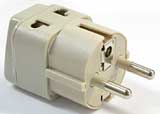 Grounded Universal 2 in 1 Plug Adapter
Grounded Universal 2 in 1 Plug Adapter
European Schuko plug.
4.8 mm prongs.
Equivalent to type E and F.
You can use this ungrounded Euro plug in some European countries.
#E-020
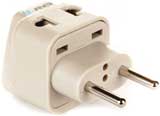 Universal 2 in 1 Plug Adapter
Universal 2 in 1 Plug Adapter
Euro Plug
4.0 mm prongs.
Equivalent to type C.
This is a universal plug adapter for the UK and Ireland.
#E-030
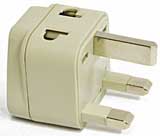 AC Adapter Plug for use in England, Scotland, Wales, and Ireland
AC Adapter Plug for use in England, Scotland, Wales, and Ireland
Equivalent to type G.
Here is the Swiss version.
#E-040
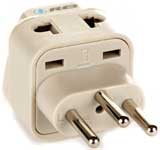 Grounded Universal 2 in 1 Plug Adapter
Grounded Universal 2 in 1 Plug Adapter
Type J for Switzerland
Here is the grounded Italian model.
#E-050
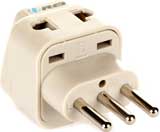 Grounded Universal 2 in 1 Plug Adapter
Grounded Universal 2 in 1 Plug Adapter
Type L for Italy
This 50 watt 220/110 volt step down transformer is good for very small 110 volt appliances and light duty chargers.
#E-070
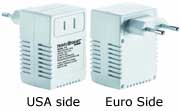 Travel Smart by Conair 50-Watt International Transformer
Travel Smart by Conair 50-Watt International Transformer
Rolling luggage sure beats lugging a pack on your back.
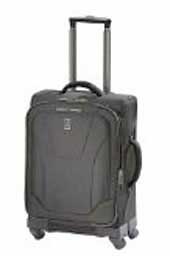 Travelpro Luggage Maxlite 2 20" Expandable Spinner
Travelpro Luggage Maxlite 2 20" Expandable Spinner
A shoulder bag for your daily walk-about.
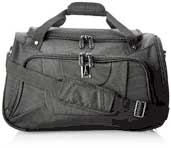 Travelpro Luggage Maxlite3 Soft Tote
Travelpro Luggage Maxlite3 Soft Tote
Keep your stuff organized.

Luggage Packing Cubes
eBags 3pc Set
Wear a money belt under your shirt to protect your passport and valuables, especially if you are staying in hostels or dorms.
 Lewis N. Clark RFID Blocking Waist Stash
Lewis N. Clark RFID Blocking Waist Stash
An RFID blocking wallet protects your passport and credit cards from identity theft in public places.
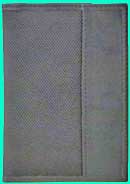 Travelon RFID Blocking Passport Case
Travelon RFID Blocking Passport Case
A Swiss Army Knife is unquestionably the handiest item a traveler can carry, except not on a plane.
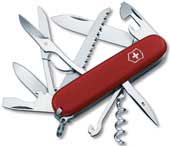 Victorinox Swiss Army Huntsman II Knife
Victorinox Swiss Army Huntsman II Knife
One of my favorite books. Ernest Hemingway in Paris.
 A Moveable Feast
A Moveable Feast
by Ernest Hemingway
HOW TO EUROPE
The Complete Travelers Handbook
Table of Contents
Chapter 1
What's It All About?Travel Like a Native In Europe
Chapter 2, Part 1
On Budget in EuropeTravel Costs: How Much?
Chapter 2, Part 2
Europe on WHAT! Per Day?My Actual Expenses
Chapter 3
Passport and VisasIdentity and Travel Documents for Europe
Chapter 4
Flying to EuropeTravel Starts at the Airport
Chapter 5
What to Wear in EuropeYour Best Travel Clothes
for All Occasions
Chapter 6 Part 1
Pack Light Field TestTravel Europe in Comfort and Style
Chapter 6 Part 2
Personal Care ItemsPack Your Toothbrush, Hair Blower, Toilet Paper, and Vinegar.
Chapter 6 Part 3
Travel SuppliesSmall Stuff Packing List
Chapter 6 Part 4
Bringing Valuables to EuropeNot in Your Luggage or Purse
Chapter 7
Luggage for EuropePack Light, Let It Roll
Chapter 8 Part 1
Pickpockets in EuropeThey're Everywhere
Chapter 8 Part 2
ATMs in EuropeMachines Dispense Travel Cash
Chapter 8 Part 3
Cash and CreditPaying Your Way in Europe
Chapter 8 Part 4
Money PotpourriCash, Coins, Transfer, Barter
Chapter 9
Your Travel Diary of EuropeBlog It
Chapter 10
Europe Guide BooksReviews of Tomes for Travelers
Chapter 11, Part 1
Electric Converters in EuropeWhy You Should
NEVER Use a Converter
Chapter 11, Part 2
European ElectricityOutlets, Plugs, Converters, Adapters, Voltage, Power, Frequency, Watts.
Chapter 12
Photography in EuropeTake Your Best Shot
Chapter 13
Bring a SmileTravel Europe in Good Attitude
Chapter 14
Hotels, B&Bs, Hostels, HomesEuropean Travelers' Sleep Options
Chapter 15
Eating In EuropeTravel on Thy Belly
Chapter 16
City Transport in EuropeBus, Streetcar, Subway, Taxi, Bike, Shoe, Gondola
Chapter 17, part 1,
Trains in EuropeA Rail Primer
Chapter 17, part 2,
European Rail StationsFinding Your Way
Chapter 17, part 3,
Night Trains in EuropeSleeping City to City
Chapter 17, part 4,
Europe's Boat and Bus ServicesHigh Seas Ferry, Highway Coach
Chapter 18, part 1
European Auto RentalDetails and Documentation
Chapter 18, part 2
Driving in EuropeBack Alley to Blazing Autobahn
Chapter 18, part 3
Driving Habits and LawsPolice, Speed Limits, Tailgaters
Chapter 18, part 4
Parking, Gasoline, SafetyAdjuncts to Driving in Europe
Free to use but not to abuse.
Copyright:
Internet edition
© 2001-2016 James J. Broad
All rights reserved. Tous droits réservés.
This is copyrighted material. Do not reproduce, copy, plagiarize, re-craft,
store, modify, extract, transmit, or purloin any part of this
publication in any nation in any form or by any means or for any purpose whatsoever without permission
in writing.
Copying:
You may print one paper copy of this web page for your personal use.
Permissions:
If you want to adapt any part of this material to use in your blog, forum, web site, book, article,
speech, term paper, movie, video, or any other media please write to me and get
permission before you do so. Otherwise it is a copyright violation or plagiarism.
Plagiarism includes paraphrasing text and copying ideas. Imitation,
the old saying goes, may be the highest form of flattery. However, plagiarism is outright theft and is usually
compounded by the lies of the perpetrator.
Everything on my web site is original, created at great personal expense
in time and cash in the course of my extensive travels throughout Europe. Please respect my property.
For detailed descriptions of the many forms of plagiarism see
Plagiarism.org and
A Plagiarism Guide for Students.
For permission to use material from this web site contact:
[email protected].
Webmasters:
You may link the URL http://www.enjoy-europe.com/hte/chap19/phone.htm freely. Please do. When you link please send the URL for your linking page and a crosslink will be installed in one of the categories of the TRAVELERS YELLOW PAGES to your site if it has significant content for travelers in Europe.
Free, free, and free
This web site is totally free for everyone, and a labor of love for me.
Support
To keep enjoy-europe.com afloat I advertise scores of travel related books and products. My site receives
a commission from Amazon.com for all goods purchased through the advert links. These advert links are
displayed on individual pages and on my on-line store at
 . Your support is most gratefully appreciated. TIA.
. Your support is most gratefully appreciated. TIA.
Your Blow Back
I welcome questions, comments, and complaints. If you have any concerns about your trip to Europe that have not been covered well enough on my web site please do not hesitate to write. Ask, cuss, discuss, or whatever. I read every email and update my pages when I see a question repeating,
Utilities:
- How To Europe: The Complete Travelers Handbook.
- Home.
- To the top of this page
- E-Mail to John Bermont
- Meet the Author
- Privacy Policy
- Site Map
- Advertising Policy





